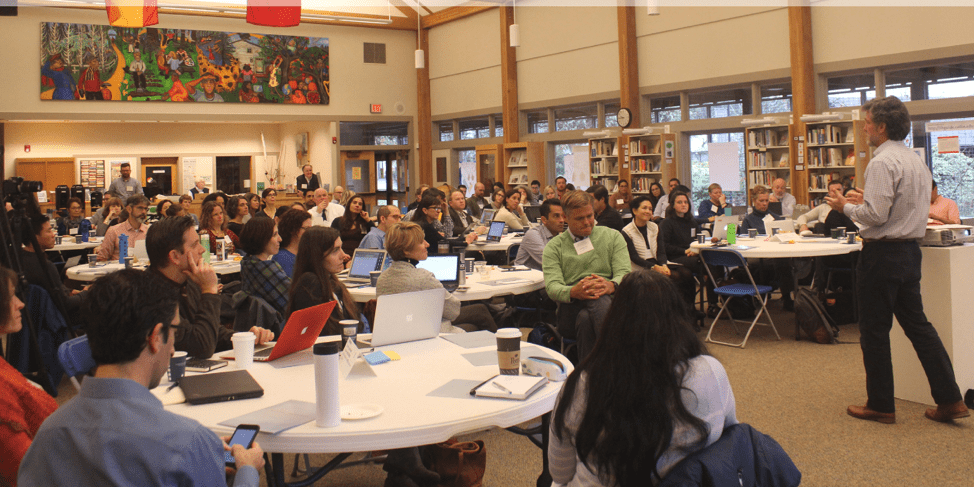What would school be like if the traditional transcript—that all-important list of courses taken and grades earned—went the way of the dinosaurs?
That is the express aim of a fast-growing education reform group called the Mastery Transcript Consortium, or MTC.
The MTC is a coalition of more than 130 independent schools united in the belief that the current high school transcript is an outdated tool that has students more focused on going through the motions of school and mastering the grading system than on delving deeply into content in pursuit of a meaningful learning experience. Schools participating in the Consortium are looking to develop a better model for reporting student learning and growth, one that connects core content to meta-skills like collaboration, communication, or creative thinking and that emphasizes applied learning that can be showcased in examples of students’ work. The hope is that by changing the way schools document the learning journey of students, the Consortium will not only foster more innovative and effective teaching practices, but will also change the way that colleges and universities evaluate applicants, all toward radical improvement of the student experience.
In the new transcript envisioned by the MTC, students would no longer receive credits and letter grades in isolated courses like Spanish 2 or Honors Geometry, but would instead earn broader “mastery credits” in interdisciplinary areas like Global Readiness or Visual and Spatial Reasoning, with evidence of mastery captured in a portfolio. The types of mastery credits available and the criteria for earning them would be determined by each individual school in accordance with its particular mission, vision and values, and evidence of mastery would come not only from course work, but also extracurricular accomplishments, work experience, independent study, summer enrichment, community service, etc. Most importantly, the evidence of mastery curated by the students would stand on its own, without being distilled into any kind of letter or numerical grade.
As for the logistics of this new “mastery transcript,” the MTC intends to build a common digital platform that would enable college admission officers to access a one-page summary of credits earned, then click on a specific credit to see the supporting standards, and then click on a standard to see the performance evidence. This multi-dimensional format would provide colleges and universities with a much fuller picture of the specific strengths of a student, giving depth and transparency to the student’s work record while still allowing the top level of the transcript to be read in under two minutes.
A key challenge facing the MTC, of course, is getting colleges and universities to accept the new transcript, which the MTC hopes to accomplish largely through the strength of its membership. According to the organizers of the MTC, the great respect that top colleges have for the graduates of MTC member schools will help to ensure that the prototype designed by the group will be taken seriously. The MTC has also actively enlisted colleges and universities as partners to provide guidance and feedback.
While the MTC certainly has its skeptics and critics and widespread systemic change is still years away, the Consortium has at the very least created a powerful framework for bringing like-minded schools together for much-needed conversation about a system long overdue for a redesign. How might we reimagine curriculum and assessment to more effectively tap into students’ intrinsic motivation, reduce anxiety, nurture intellectual curiosity and promote deeper understanding? It is this larger question, and the opportunity to connect with other forward-thinking schools to consider the possibilities, that prompted Cary Academy to join the MTC in Fall 2017. For our school, the value of the Consortium lies less in the product itself (an alternative transcript) than in the collaborative process surrounding its development. The core principles underlying the work of the MTC align well with our strategic vision to create learning opportunities that are flexible, personalized, and relevant and to cultivate self-directed and bold life-long learners who make meaningful contributions to the world. We look forward to another round of exploration and ideation with MTC member schools when we attend our next Consortium workshop at the Nueva School in Fall 2018.
If you would like to read more about the Mastery Transcript Consortium, I recommend an article written by MTC founder and board chair Scott Looney for the NAIS website:
https://www.nais.org/learn/independent-ideas/september-2017/independent-schools-come-together-to-build-a-new-high-school-transcript-(1)/.


